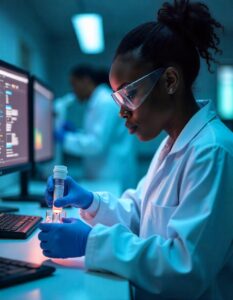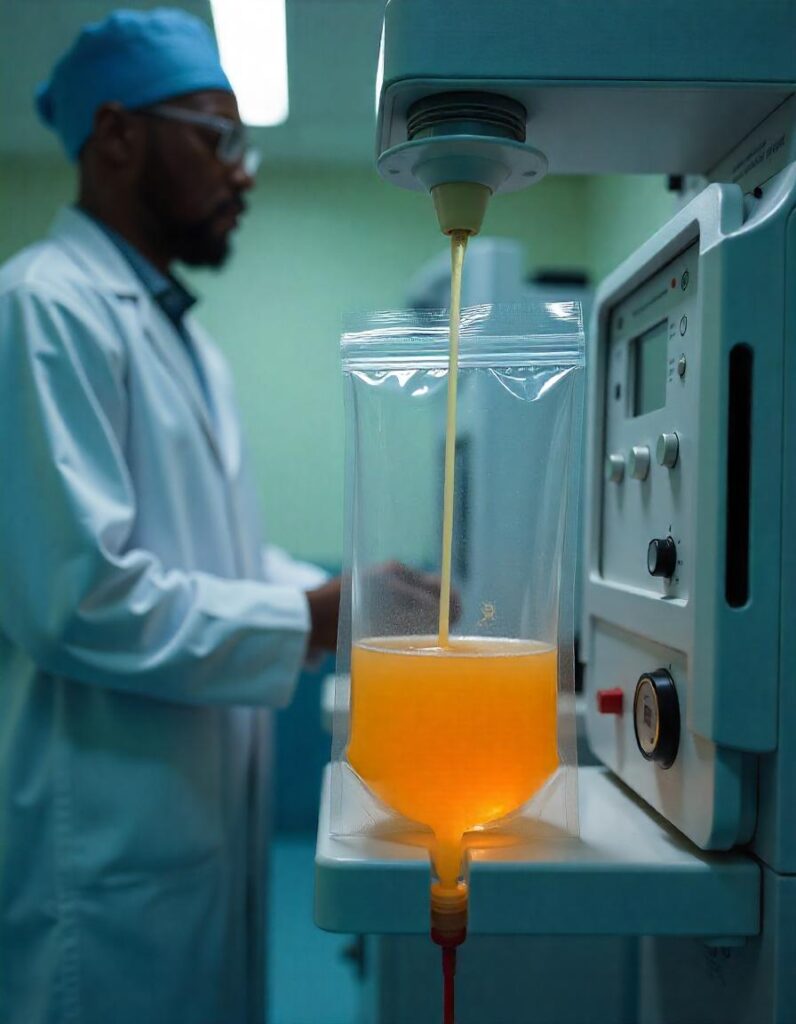When you hear the word “blood plasma,” what comes to mind? For many, it may seem like a medical term that’s too complex to understand. However, blood plasma plays a crucial role in medical treatments and has the potential to save countless lives. In Nigeria, where healthcare needs continue to rise, understanding the science behind blood plasma and its applications can help improve patient care, drive awareness, and encourage blood donation.
What is Blood Plasma?
Blood plasma is the pale yellow liquid component of blood that holds the blood cells in suspension. It is made up of water, electrolytes, proteins, nutrients, and waste products. Approximately 55% of your blood consists of plasma, which transports nutrients, hormones, and proteins to the parts of your body that need them. Plasma also helps remove waste products from cells. It’s primarily composed of water (about 92%), and its proteins play vital roles in clotting, immune system defense, and maintaining blood pressure.
The Crucial Role of Plasma in Medical Treatments
Blood plasma is an essential part of various life-saving treatments, and its uses go far beyond what most people might think. Here are some of the key ways blood plasma is used in medicine:
-
Plasma Donation Saves Lives: Plasma donation is a critical part of treating patients with conditions such as burn injuries, liver diseases, and clotting disorders. Plasma is used in creating clotting factor therapies for patients with hemophilia, a genetic disorder that prevents blood from clotting normally. This treatment helps individuals lead active lives without the constant risk of bleeding out from even minor injuries.
-
Immunotherapy and Blood Plasma: Plasma also plays a role in immunotherapy, particularly for those suffering from immune deficiencies. When blood plasma is donated, it is processed to extract the antibodies needed to treat diseases like diphtheria and tetanus. This is why blood donation is often seen as the most direct way to help save lives.
-
Plasma for Cancer and Burn Patients: Plasma is crucial in cancer treatment and in managing burn victims. High-protein plasma, also known as “plasma exchange,” is used to treat individuals whose immune system is compromised due to cancer treatment. Burn victims often need plasma to help repair the damage to their skin and internal organs.
-
Plasma Donation Centers in Nigeria: Plasma donation centers, such as Oneus in Nigeria, play a critical role in ensuring that plasma is available for these life-saving treatments. These centers help patients by collecting and storing plasma safely. Oneus focuses on providing plasma donations that meet high standards, ensuring that the plasma provided is both safe and effective for treating patients in need.
How Plasma Donation Works

The process of plasma donation is relatively simple and safe. Similar to donating blood, a needle is used to withdraw blood, which is then separated in a machine. The plasma is collected while the rest of the blood components, such as red and white blood cells and platelets, are returned to the donor’s body. Plasma donation usually takes about 45 minutes, and donors are advised to hydrate before the donation.
In Nigeria, one of the leading plasma donation centers, Oneus, has helped streamline this process to ensure the safety of both the donor and the recipient. The Oneus plasma center is equipped with modern technology to facilitate the extraction of plasma, and the staff ensures that donors are comfortable throughout the process. Plasma donation is a safe and vital way to contribute to healthcare, and it can help save lives by providing critical resources to patients who need them.
Blood Donation and Its Connection to Plasma
While blood plasma is essential, it’s also important to understand the role of blood donation in this process. Blood donations are often required for those who need plasma, red blood cells, or platelets. Many hospitals in Nigeria rely on a steady supply of blood donations to treat accidents, surgeries, and various illnesses. Blood donation benefits are well-documented: it boosts the blood bank, helps those in need, and even offers health benefits to the donor, such as reduced iron levels and improved cardiovascular health.
The Importance of Donating Plasma in Nigeria
Nigeria faces several healthcare challenges, including blood shortages. As of now, many Nigerian hospitals rely on a combination of government support, private donations, and the work of plasma donation centers like Oneus to stock their blood banks. However, there’s still a growing need for plasma donations to ensure that every patient in need receives the treatment they deserve.
Risks of Not Donating Plasma
Not donating plasma when you are able can have serious consequences. Blood banks can quickly run out of life-saving plasma, especially in times of crisis. By not donating, you are potentially limiting the healthcare resources available to the sick and injured in your community. The demand for plasma donation is high, and regular contributions are necessary to maintain a healthy supply.
Give Blood, Save a Life
Whether it’s through blood plasma donation or other forms of blood-related donations, every donation matters. In Nigeria, we need more people to get involved and help those in urgent need of life-saving plasma and blood products. Consider donating your plasma at a plasma donation center near you.
By giving blood, you’re giving someone the chance at life.
Call to Action
If you’re ready to make a difference, give blood and save a life today! Book your donation now at Oneus. Contact us at info@oneusng.com or call us at +234 902 168 2822. For more information, visit www.oneusng.com. Your donation could be the difference between life and death for someone in need.




